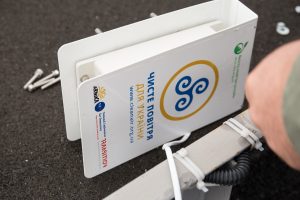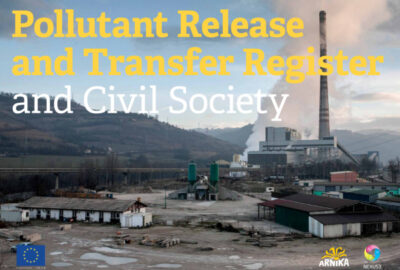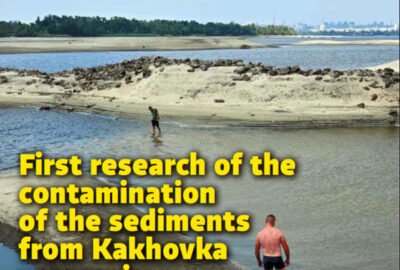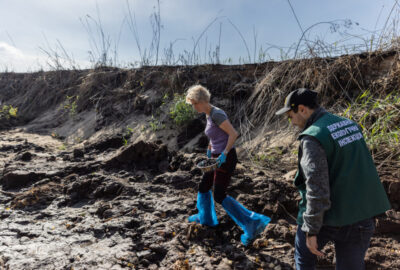For the first time in Ukraine, the international project “Clean Air for Ukraine” has created an opportunity for owners of public air quality monitoring stations to apply for free technical support, setup and maintenance of equipment. What does it mean for owners of the stations? Read on.
“The state system of environmental monitoring in Ukraine, which meets the standards common in the EU, is just beginning to be created. There is no sufficient regulatory framework and appropriate technical and resource support for this. For Ukrainians, the only source of relevant information on environmental safety remains the independent public monitoring,” said Martin Skalsky, an expert on public participation from Arnika (Prague, Czechia) focusing on industrial air pollution in Ukraine and other countries.
“Over the last three years, the network of public monitoring of air pollution in Ukraine has achieved incredible results. To this moment, more than 1000 public monitoring stations have been installed throughout Ukraine. The network is actively developing, becoming more technologically advanced and perfect,” said Maksym Soroka, an expert on environmental safety and environmental monitoring, scientific and technical advisor of the Clean Air for Ukraine project.
The EcoCity project team, together with the Clean Air for Ukraine project and regional partners, has already installed more than 500 monitoring stations. The EcoCity network leads among other public initiatives that form a public network for monitoring the air quality in Ukraine, in the number of stations, the amount of monitored pollutants and prevalence in various regions of Ukraine.
In his report, Maksym Soroka drew attention to the problem faced by the Ukrainian Network of Public Air Quality Monitoring: “The development of the network has approached the transition from the amount of accumulated data to their quality. Currently, the analysis of the data shows an alarming trend of increasing the number of stations that have been installed, but after some time stopped working and providing data on air quality. Forecasting and assessing the risks associated with air pollution requires constant monitoring and comparison of results at different times of the year.”
After interviewing the owners of public air monitoring stations, as well as coordinators of environmental initiatives that take care of this issue, the expert found out that the main reason for most cases of station inactivity are technical problems that station owners and environmental activists cannot repair on their own.
“Like any other technical system used in different weather conditions, monitoring stations can also fail, and the sensors in the stations themselves become dirty or degraded over time. As a developer of such stations, I can say with confidence that there are one hundred and one reasons why your station stopped working, disappeared from the map, or why its values seem strange,” said Oleksiy Trelevsky, curator of the network of public monitoring stations EcoCity.
Quite often environmental activists face problems with setting up stations or with various critical malfunctions – resulting in strange, distorted and sometimes inadequate results.
Maksym Soroka explains: “Users facing such problems simply do not know how to solve them. Environmental activists have questions about the data quality of this station and, as a result, the station is deliberately disconnected from the network, losing interest in public monitoring – as a socio-environmental phenomenon. In this sense, initiatives that disseminate public air monitoring practices should have extended responsibilities. To paraphrase Saint-Exupery, we are responsible for the system we have created and the people who have been given hope for clean air in Ukraine.”
To help volunteers and environmental activists who run public monitoring stations, the Clean Air for Ukraine project, together with the EcoCity team, launched the Customer Technical Support Program for the first time in Ukraine. This program is based on methodological recommendations and international experience of the EU and the US.
“If the user knew that his station could be restored to factory settings, we might not have had so many disconnected stations in the recent years. The EcoCity team has the experience and technical capabilities to do this. Thus, together we can return to the active network of public air monitoring most of the stations that are not currently active,” said Oleksiy Trelevsky.
What does the Technical Support Program of the Clean Air for Ukraine project envisage?
In general, the Technical Support Program has four main objectives:
1 – Technical support for volunteers and activists who already have monitoring stations (consulting, maintenance, cleaning, repair, modernization, calibration or restoration or replacement of sensors);
2 – Support and counseling of volunteers, activists or public initiatives wishing to join the Ukrainian network of public air monitoring;
3 – Global inventory of the public monitoring network;
4 – Preparation and conducting the “Great Metrological Experiment”.
For which types of stations is the technical support provided?
Oleksiy Trelevsky emphasizes that they offer technical support to all users of public monitoring stations in Ukraine: EcoCity, SaveDnipro, Luftdaten or 7-bit AirPol.
“Our technical support team has enough experience to help and give advice to all users of existing stations, regardless of the manufacturer. In this way, we make it easier for users to operate their stations,” emphasizes Oleksiy Trelevsky. “Preferably the stations measure the fine dust of two or three fractions. There are also more functional stations from EcoCity, which use different types of sensors to measure up to 19 pollutants in the air.”
The experience of EcoCity specialists has shown that over time, the base station (approximately 80 % of the active network) is damaged by the timer and begins to show inappropriate values: “We have learned to repair damaged timers, return them to factory settings. The cost of restoring such a station is at least 5 times cheaper than the cost of a new station. Such a recovery is economically feasible for users and can tip the scales in favor of public monitoring and even improve the quality of the accumulated data,” said Oleksiy Trelevsky.
The main tasks of technical support:
- Facilitate the operation of air monitoring stations;
- Increase the number of active stations, not only by attracting new citizens to the monitoring network, but also by restoring old stations and returning old users.
- Change the approach to the formation of the public monitoring network: from the number of stations to the quality of the received data.
Under what conditions is technical support provided?
Anyone who has a public air quality monitoring station from any manufacturer can get advice on its maintenance.
Anyone can fill out the online form or ask questions by phone on 066-203-64-72 or 097-690-22-96 or write in Viber, Telegram at any time.

The service is provided free of charge by specialists from EcoCity (Ivano-Frankivsk) with the support of the international Czech-Ukrainian project “Clean Air for Ukraine”, which is implemented in industrial cities by NGOs “Arnika” (Czechia) and ”FreeArduino” with the financial support of the Ministry of Foreign Affairs of the Czech Republic within the Transition Promotion Program and the National Endowment for Democracy (USA).







